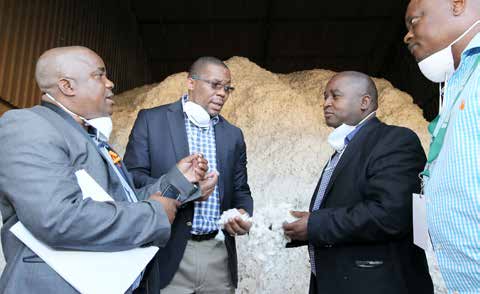The lives of residents of Jozini, KwaZulu-Natal (KZN), have changed for the better since the re-opening of Makhathini Gin cotton project. The Makhathini Cotton Farm was bought by the National Department of Agriculture Fisheries and Forestry (DAFF) and the KZN Department of Agriculture and Rural Development.
 It was bought as part of government’s Comprehensive Rural Development Programme (CRDP), that aims to tackle issues such as underdevelopment, food security, unemployment, poverty and other social ills in rural areas.
It was bought as part of government’s Comprehensive Rural Development Programme (CRDP), that aims to tackle issues such as underdevelopment, food security, unemployment, poverty and other social ills in rural areas.
In the 2014/2015 financial year the KZN Department of Agriculture and Rural Development (DARD) spent more than R1.4 million in support of Makhathini Gin cotton project in Makhathini area.
During a recent visit to the project, MEC Cyril Xaba, who was accompanied by Deputy Minister for Rural Development and Land Reform Mcebisi Skwatsha, said the aim was to grow the farming sector so that it could help grow the economy and create jobs in the province.
“This initiative aims to enhance cotton production by small holder farmers in the Makhathini region to enable them to become sustainable producers of quality cotton and become involved additional phases of the value chain. This will also apply to the on-going job creation potential of the project related to continuous cotton production to feed the entire value chain via the Makhathini Gin,” he said.
Deputy Minister Skwatsha said since the start of the project more than 30 farmers associations with 1 579 farmers from the area were benefiting from it.
“Farmers were selected by Ubongwa Farmers’ Cooperative based on their skills that would be beneficial to Makhathini Gin cotton project.
“This will result in farmers being involved in more stages of the value chain of cotton processing. They will also be responsible for the marketing of the cotton processed through the Gin and have already negotiated contracts with spinners. Their intention is to take responsibility for their own cotton from production until processed into garments for the retail industry,” he said.
Matozi Simelane, chairperson for the farmers, said more than 590 seasonal jobs were created by the gin during the 2014/2015 financial year.
“The project had 17 people being employed full-time at the gin for the period of 15 months, three vacancies have been created for the mentoring and training through LIMA, 11 jobs have been created for security farm guards, 23 jobs for erecting the fencing of Ikhwehle, one for safety officer, and three extension staff,” she said.
More than 577 famers who are part of 2014/15 beneficiaries are currently busy with the cotton harvesting. This has made a difference to many households in the area.
“During planting and harvesting season, we employ more temporary workers of which will help generate revenue for some households around the area. Last year alone we managed to get just over R3 million during the sale of cotton in the Gin. We hope that as from next year we will double our sales as we are in the process of getting 2 500 hectares of land that will produce cotton around Makhathini. We also try by all means to put more women under our association.”
She added that there were currently 33 per cent male farmers (525), while 59 per cent were female (938) and 8 per cent (129) youth,” Simelane said.
Deputy Minister Skwatsha said people in rural areas deserve a better quality of life.
“Through the implementation of the Comprehensive Rural Development Programme we are beginning to see a transformation of the rural landscape of our country and the improvement in the livelihoods of rural communities. We hope that the people of Jozini will hold hands together with Ubongwa to ensure that this project is sustainable,” said the Deputy Minister.



 Facebook
Facebook Twitter
Twitter WhatsApp
WhatsApp